Column: Humans without humans
Writer analyzes long-term effects of social distancing on body, mind, soul
Nine-year old London-Olevia Brown cries as she presses her hand to the gloved hand of her adult sister, Itzy Hernandez, against a window. Social distancing is a necessary measure that many countries have undertaken to slow the spread of the coronavirus. But what will its long term effects be, aside from flattening the curve? Columnist Kate L. Keeler examines the possible outcomes of humans being left without humans.
Social distancing. Ah, the extrovert’s worst nightmare. But social distancing is affecting all of us — even the introverts like myself. We are all subject to this strange and new yoke. From not being able to physically be with friends and extended family, to being stuck at home for what could be months to come, social distancing is truly a burden. But will its effects stop at simply being temporally burdensome? Likely not.
For the record, I am not writing this column to bash social distancing. Social distancing is a necessary measure in light of COVID-19 that should be heeded with the greatest care. However, as the months drone on, the long-term consequences of social distancing — of humans being left without humans — will inevitably be unveiled. I am writing this column because, in these changing times, it is always a good idea to think ahead.
The body
Social distancing is most certainly beneficial for the body at the moment. At least from my understanding, the vast majority of people would not appreciate contracting the coronavirus. But although fear of COVID-19 may be trying to take over our minds, a virus, albeit grave, is but one of the body’ s worries.
The immune system
While our immune systems are being protected from having to go to war with the coronavirus thanks to social distancing, the psychological stress social distancing effectuates may lower the immune system.
“Ongoing stress makes us susceptible to illness and disease because the brain sends defense signals to the endocrine system, which then releases an array of hormones that not only gets us ready for emergency situations but severely depresses our immunity at the same time,” Associate Professor of Anatomy and Physiology at North Carolina A&T University Andrew Goliszek wrote for Psychology Today. “Some experts claim that stress is responsible for as much as 90% of all illnesses and diseases … The way it does this is by triggering chemical reactions and flooding the body with cortisol that, among other things, decreases inflammation, decreases white blood cells and NK cells (special cells that kill cancer), increases tumor development and growth, and increases the rate of infection and tissue damage.”
So how to make sure that our immune systems stay in fighting condition despite stress? They need to be ready for battle now perhaps more than ever.
According to the American Psychological Association, “managing stress, especially chronic or long-term stress (even if it’s not intense), may help people to fight germs … health can benefit from conscientious stress management.”
Although we may be in the midst of a world health crisis, many of us are stuck at home. We have an obligation as human beings past the age of twelve to stay informed about what is going on outside of our neighborhoods and complexes, but we also have the power to turn off the TV and tuck the phone away once we have been adequately informed.
Although we may be in the midst of a world health crisis, many of us are stuck at home. We have an obligation as human beings past the age of twelve to stay informed about what is going on outside of our neighborhoods and complexes, but we also have the power to turn off the TV and tuck the phone away once we have been adequately informed.
— Kate L. Keeler
The microbiome
Our microbiome, the community of microorganisms that live on and within us, could be being affected by social distancing.
“Social contact can clearly spread disease … But the germs behind infectious illnesses are but a tiny fraction of our full microbiome,” science journalist Ed Yong wrote for The Atlantic. “Most of these (germs) are harmless, perhaps even helpful. And they can hop between individuals.”
Being 6 feet apart from everyone outside of our homes means less exposure to both the good and bad microbes we normally exchange among ourselves. In these times of a particularly nasty microbe getting passed around, the bad outweighs the good, and it becomes necessary to distance ourselves from each other. But outside of times like these, the good outweighs the bad, and the physically closer we are to our fellow humans, the more diverse our microbiomes are, and, arguably, the healthier we are.
“Exposure to microbes is an essential part of being human. Most of our immune system is comprised of tissue that requires activation by the microbes we’re exposed to,” microbiologist Kiran Krishnan said in an article for U.S News and World Report. “The immune system requires the presence of friendly bacteria to regulate its functions. Think of the immune system as an army, with tanks and missiles but no general to lead them. That’s the role friendly microbes play in your body; they’re the general.”
But how can we ensure that our microbiomes stay diverse when they encounter less microbiomes to exchange microbes with? According to Krishnan, get outside — 6 feet apart from others, of course.
“Almost everywhere we go in the environment, from parks to woods to rivers, we come into contact with microbes,” Krishnan said.
But what if the weather is bad? It is springtime in Texas, after all. In that instance, and even in the instance that you enjoy being outside during a hailstorm, make sure your home is clean, but not too clean.
“You actually want to build a healthy microbial environment in your house,” Krishnan said. “You don’t want to live in a sterilized house.”
While social distancing may be leaving humans without humans — and thus with less of the good microbes that we normally share between each other more often — ways exist to maintain a healthy microbiome and thus a healthy immune system. But please, be sure to keep your distance as you go singing in the rain.
The mind
There are many ways that humans seek to relieve stress, but arguably one of the most effective methods is by being in the company of fellow humans. There is scarcely a more stressful time than a pandemic, and yet we humans must be deprived of companionship with our fellow humans.
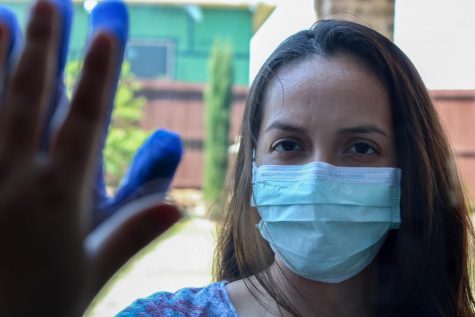
Itzy Hernandez looks at her little sister, nine-year old London-Olevia Brown, through a glass window. There are many ways that humans seek to relieve stress, but arguably one of the most effective methods is by being in the company of fellow humans. There is scarcely a more stressful time than a pandemic, and yet we humans must be deprived of companionship with our fellow humans.
“In times of stress … being deprived of social connection can create more stress,” Jonathan Kanter, the research associate professor for the Department of Psychology at the University of Washington, and Adam Kuczynski wrote for the Press Herald. “People who are lonely have higher levels of the hormone cortisol, an indicator of stress.”
Stress, when not managed properly, births a plethora of adverse effects, ranging from headaches to a lower immune system response, as previously discussed.
To manage stress, we must manage our minds. Mind over matter, as they say.
But while exercise, meditation and other stress-relieving techniques may help most of us cope with the stress that social distancing induces, it is not so easy for those who struggle with mental health ailments like depression.
“If you can, picture carrying around a bucket that gets filled up by various pressures, and the more filled it gets, the harder it is to walk,” Dr. Lynn Bufka, associate executive director for research and policy for the American Psychological Association said for an NBC article. “Depression is something that takes up a lot of space in a bucket. It makes carrying it around more unwieldy. If you add in the stressor of coronavirus, it can get filled up past the top.”
It is the responsibility for those who do not suffer from mental health issues to reach out to those who do. Moreover, it is the responsibility of all of us who have the capability to reach out to anyone who might need it, even those who we think are the happiest and healthiest people we know.
The soul
There is a certain depth to being a human being. Regardless of evolutionary versus creationary theory, it is only logical to think that we humans are above the other creatures we share this world with, and that is because we are separated from them in a very unique way. From the most majestic rose to the cleverest dog, nothing surpasses this depth that humans possess. This depth extends past our minds. It is above our bodies. It is our souls.
Our souls are currently being deprived of the human connection they crave. Sure, many of us live with others. But also for many of us, we love and normally experience day-to-day meaningful connections with people outside of our homes. Thanks to social distancing, the comfort in both the normalcy and the enjoyment of those interactions has been ripped right out of our hands. And although virtual-meeting platforms enable us to engage verbally and visually with those who we do not live with, the absence of a key part of human connection sticks out like a sore thumb. Physical touch is missing. The near-divine sensations of hugging someone, especially when you or they really need it, are gone. The art of kissing an old lady on the cheek is no more. The warmth of the hand of your significant other’s in yours is to be lost during these times. All of those absences evoke a certain emptiness and longing that extends past the chemical reactions in our bodies and minds, and into our souls.
I dare say that although a cruel 6-foot distance has been placed between humans, this is a wonderful opportunity for us to come closer together.
— Kate L. Keeler
I dare say that although a cruel 6-foot distance has been placed between humans, this is a wonderful opportunity for us to come closer together. (Not literally, Dr. Fauci. Don’t send the government after me, please). This time of humans being without humans is no time to despair. Rather, it is a time to grow. People wonder why, if there is a God, and how, if he is good, bad things like pandemics happen. But maybe they happen because we need to change. To change how we treat God and each other. And what better time to change than in the comfort of our own homes?
Social distancing is in effect because of the outbreak of a terrible virus. May social distancing now foster a wonderful outbreak of love — of that pure, mysterious love which binds us all.
Your donation will support the student journalists of Prosper High School. Your contribution will allow us to purchase equipment and cover our annual website hosting costs.




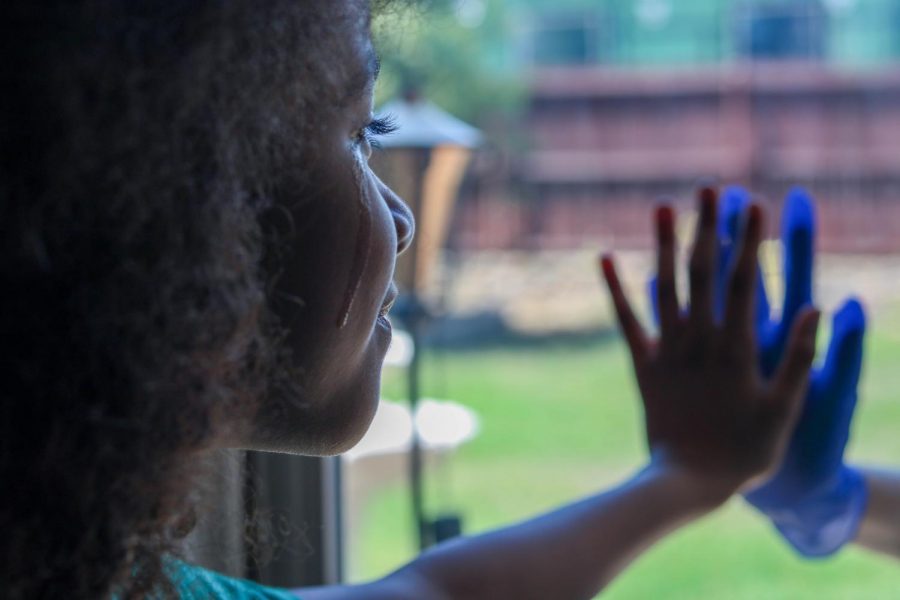
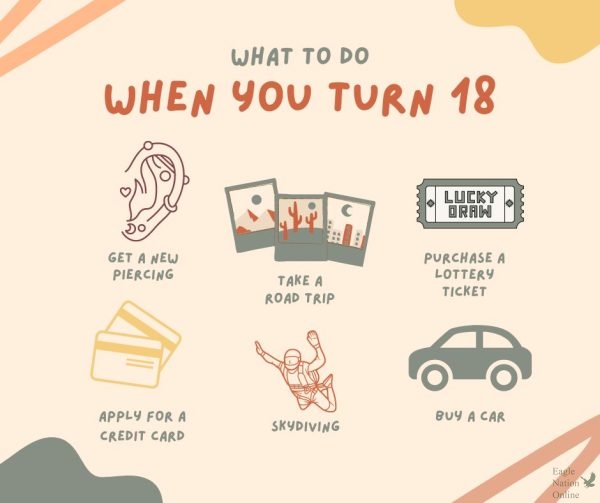
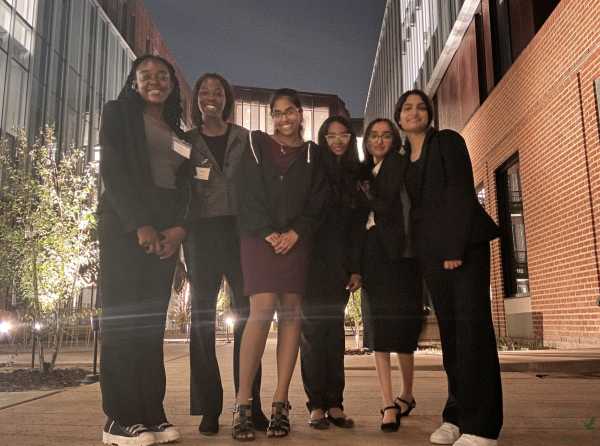


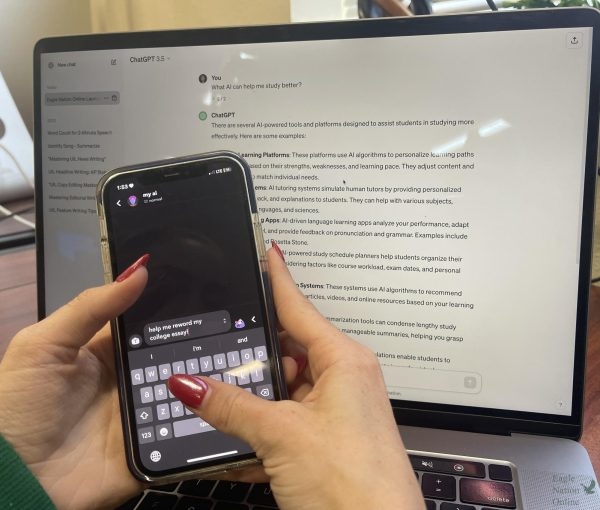


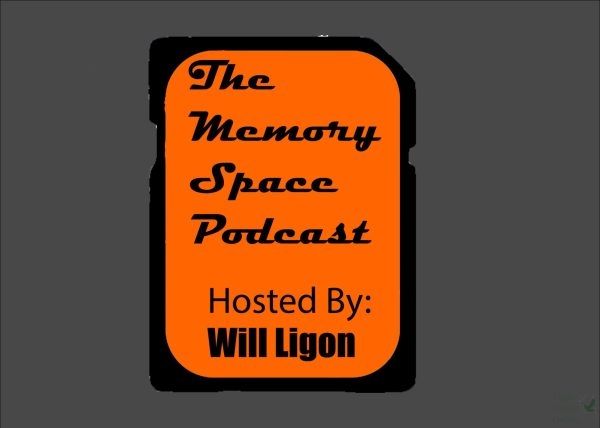



Cathy • Apr 14, 2020 at 8:41 am
I enjoyed reading this article. Kate covered a lot if material and I found it highly organized and informative. WELL DONE!